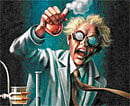
Studded with suspense and soaked in rich history, 'The Technologists' is a dazzling journey into a dangerous world not far from our own, notes James Parker
“Tell us where you get your ideas!” we demand of the talented and interesting writer.
“Oh, the imagination on you! How do you do it?” He demurs, disclaims, and we note a modest fluffing-up of authorial plumage. He knows how wonderful he is. But good prose is so much less of a mystery, finally, so much less of a shock, than bad prose. Good prose, after all, relates to our shared essence: we know it when we read it, we assent to it, we get it. Bad prose, on the other hand, is arrestingly weird. It stops the clocks and twists the wires. It knits the brow in perplexity: What the hell is this? What’s going on here?
I was brought up short, for example, very early in Matthew Pearl’s latest novel, The Technologists, by the following line: “Incredulously, the captain extended his spyglass.” I wavered and then stopped. How does one incredulously extend a spyglass? And what else can one do incredulously? Incredulously, they cut down the hanged man.
Incredulously, she flossed her perfect teeth. Incredulously, the reviewer contemplated the latest book from the best-selling author of The Dante Club and The Last Dickens, whose literarily flavoured historical novels have been published in 40 countries.
To the narrative, anyway: The year is 1868, and the captain is incredulously extending his spyglass in the direction of Boston Harbor, where a disaster is unfolding.
Schooners and pleasure steamers and barks, their compass needles all awhirl, are crashing into one another and sinking. Some malignancy has fritzed the instruments! A couple of days later, on State Street in Boston’s busy financial quarter, all the windows spontaneously melt. Even clock faces, tumblers: “The glass lenses in his eyeglasses sank into his eye sockets and left him flailing.”
Panic in the streets. A nasty stockbroker, behaving rather like the Duke brothers at the climax of Trading Places, barges through the plebs, crying: “My assets! Out of my way!”Two bizarre and terrible irruptions, two sets of unexplained phenomena. The metropolis is clearly under siege — but by whom or what? And what will happen next? Enter ‘The Technologists’, an A-Team of students, informally convened, from the newly established Massachusetts Institute of Technology. Here I began to enjoy myself.
Pearl has clearly wallowed in his research, and The Technologists is pretty good on the societal and cultural forces arrayed against the fledgling MIT Tribunes of the Industrial Revolution, warriors of enlightenment, pushing back the darkness with their inventions, its students and faculty are blackguarded left and right. The Harvard swells mock them for their closeness to the factory floor; the workers, who fear automation, throw tomatoes at them. And the city fathers, hating their Darwinism — “the despicable teaching that we are descended from monkeys” — and un-Christian newfangledness conspire against them. “Over there,” one graybeard rumbles, “they will teach atheist machinists and the sons of farmers alike. The knowledge of science in such individuals cannot fail to lead to quackery and dangerous social tendencies.”
Do you hear a whisper of The Da Vinci Code in all this? I fancy I do. The crusty hierarchy hoarding its secrets, the gnostic devotion to Truth — thanks to Dan Brown, these things are in the DNA of the modern historical-thriller blockbuster. The archenemy in The Technologists is the one they call “the experimenter”: the entity responsible for the colliding ships in Boston Harbor and the melted eyeglasses on State Street.
‘The Technologists’ have pegged him for a rogue scientist, a trickster with test tubes, and slowly, by trial and error, they draw a bead on him. They must stop him, for he represents Science’s shadow: a magus-like manipulator of matter, in the service not of knowledge but of fear.
There is romance, there are fisticuffs. Laboratories explode. The manliest of ‘The Technologists’ is haunted by his memories of the Civil War. “Say, what puts you in such a brown study this morning? That little social call yesterday from the men in blue?” Somebody says that. You see the elements assembling. What we have in The Technologists is basically a ripping yarn with some war-of-ideas apparatus and plenty of period furniture, the whole accompanied by a distracting space-junk drone of bad writing. Like this: “Entering the college’s study room, Marcus and Frank were pre-emptively hushed by a table of students in the corner before they even said anything.”
And this: “He lifted his hand to his hat, but she simply looked the other way with a crimson bloom tainting her pale cheeks.” Now that’s Victorian melodrama — Victorian pornography, almost. In a more ironic text, or one more aware of the possibility of pastiche, it might work; but Pearl appears to be using his 19th-century setting as a license to write extra-badly. Did I mention that The Technologists is nearly 500 pages long? There is a type of reader, I think, who likes to munch, munch, munch his way through a book like this. Not for him the dazzling compression, or the spark of novelty leaping from synapse to synapse — just a steady, satisfying rumination of printed matter. I don’t mean to be rude: My own taste for shorter and flashier books is probably explained by the many hours of the ‘Donkey Kong’ I played in my youth.
The point is that if the reader described above, and a sufficient number of readers like him, are alerted to the existence of The Technologists, Matthew Pearl will have another great success. If not, not.